Protection of sensitive information is a major concern in today’s world of digital technology. This is true for organizations of all types. Health Insurance Portability and Accountability Act provides strict guidelines in the healthcare sector for the administration storage, handling, and safeguarding of protected medical information (PHI). HIPAA compliance for healthcare facilities is essential to preserve their image, safeguard patient privacy and avoid fines.

HIPAA legislation governs health care providers such as health plans, health insurance companies, clearinghouses for healthcare, and business partners of HIPAA-covered entities. PHI is defined as data that can be used to identify an individual, such as names and addresses, credit cards information, social security numbers, and details of medical procedures and conditions. PHI is highly valuable on the black market due to its potential for use for identity fraud.
The HIPAA Privacy Rule sets out guidelines for disclosure and use of health-related personal information (PHI). To ensure the confidentiality, integrity and availability, covered entities are required to adopt policies and procedures. The policies and procedures must address access controls and security incident procedures security awareness training and additional security measures. Additionally, covered entities must limit the use and disclosure of PHI to the minimum required to achieve the purposes of the use or disclosure.
The HIPAA Security Rule requires covered entities to ensure the integrity, confidentiality, and accessibility of ePHI by implementing reasonable and appropriate administrative, physical and technical security measures. These safeguards include access control, audit controls, integrity controls, transmission security, and contingency planning. The covered entities are also required to perform periodic risk assessments in order to determine vulnerabilities and then implement mitigation measures.
HIPAA’s Breach Notification Rule requires covered organizations to notify affected people, the Secretary of Health and Human Services, and in certain cases, the media, in the case of a breach of PHI that is not secure. The law defines breach as acquisition, access, use, or disclosure of PHI in a manner not allowed under the Privacy Rule that interferes with the security or privacy of PHI. The covered entity must conduct a risk analysis to determine the probability that the PHI is compromised and the consequences due to the breach.
HIPAA compliance is a continual process of education and training. This assures employees are aware of their duties in regard to privacy of patients as well as security. They must also perform regular risk assessments to determine potential vulnerabilities and implement measures to limit the risk. This could include implementing security controls, including encryption of ePHI and preparing plans of action in the event an incident involving security.
Modern technology has had an enormous impact on nearly all aspects of our lives including healthcare. Electronic health records have proven revolutionary as they allow healthcare providers to store and manage the information of patients in an efficient manner. However, this has opened up security risks that are significant, making the strict adherence to HIPAA guidelines mandatory. The data of patients is extremely sensitive and must be secure throughout the day. The importance of HIPAA is higher than ever before due to the rising risk of cyberattacks. HIPAA guarantees privacy and security for patients’ information. This creates trust between healthcare professionals.
HIPAA compliance will allow healthcare organizations to protect patient privacy while maintaining the trust of patients. HIPAA violations can be the cause of fines ranging from $0 to $100,000 or more, and legal action as well as harm to your reputation. The Department of Health and Human Services’ Office for Civil Rights (OCR) is accountable to enforce HIPAA regulations. They also have the authority to investigate complaints and conduct compliance reviews.
HIPAA Compliance is essential for healthcare providers to safeguard Patient Privacy in the Digital Age. HIPAA’s regulations give specific guidelines for how to handle, store and handle secure health information. Healthcare institutions should ensure they have HIPAA-compliant policies and procedures, perform regular risk assessments, offer ongoing training and education for their employees and conduct regular risk assessments. When they do this healthcare providers can keep their patients’ trust and avoid legal actions.
For more information, click why is hipaa important